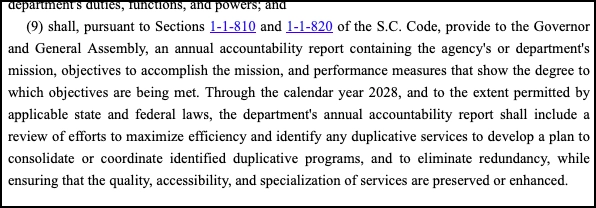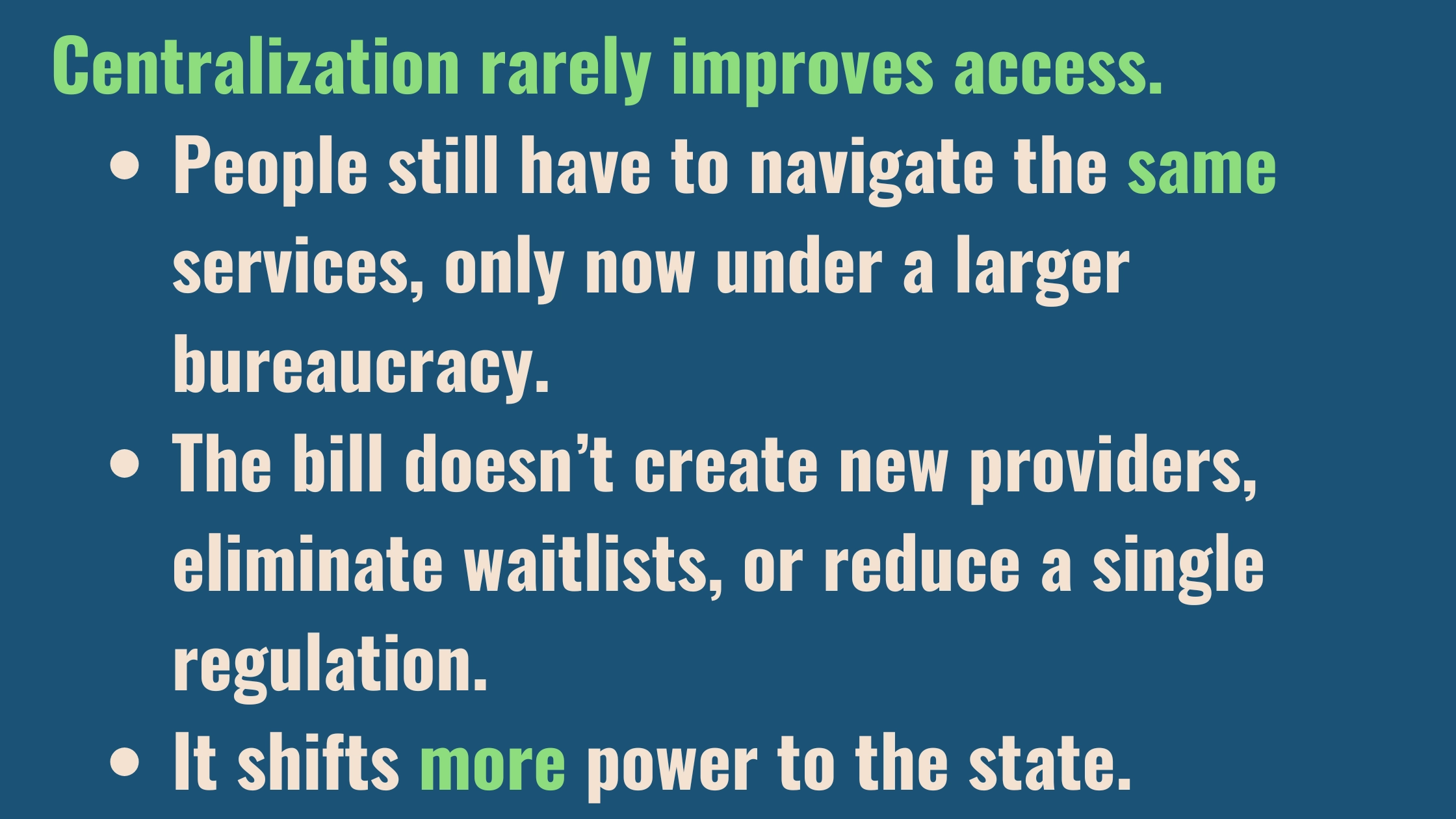Some legislators are celebrating Senate Bill 2 like it's a masterstroke in streamlining government agencies.
They're saying things like:
➔ It reduces the size and scope of government.
➔ It cleans up the inefficiencies.
➔ It's shrinking government.
Let's just say… those are interesting interpretations.
Because when you read the bill (and the fiscal impact statement), the story changes. Quickly.
Let’s go through it together.
✘ Claim: It streamlines government.
☹︎ Reality: It consolidates without reducing size, cost, or complexity.
S.2 doesn’t shrink government. It simply consolidates existing executive agencies into a new department called the Department of Behavioral Health and Developmental Disabilities (DBHDD).
It folds in:
The Department of Mental Health
The Department of Disabilities and Special Needs
The Department of Alcohol and Other Drug Abuse Services
...all get folded in as "offices."
.png)
But none of them disappear.
They just move under one big roof with a director sitting at the top, holding the keys.
In fact, Section 44-12-60 indicates that the component offices will continue carrying out their duties as provided in their respective enabling statutes.

Section 20(C) explicitly states that all employees will retain their positions under the new structure.
“Employees of the Department of Mental Health shall become employees of the Office of Mental Health within the Department of Behavioral Health and Developmental Disabilities," with similar provisions for the other departments suggesting staff are being transferred, not eliminated.”
A reorganization isn’t streamlining if it doesn’t reduce overhead, cut waste, or simplify access.
✘ Claim: It eliminates waste.
☹︎ Reality: It asks for a report. That's it.
"Through the calendar year 2028… the department's annual report shall include a review of efforts to maximize efficiency and identify any duplicative services..."

That's more like a polite suggestion.
There's no enforcement. No action plan. No required cuts. No deadline. Just a hope that someone might, possibly, one day write a paragraph about waste.
✘ Claim: It reduces government jobs.
☹︎ Reality: It explicitly keeps all employees.
"Employees... shall maintain their same status with the appropriate component departments…" [Bill Reference: Section 20(C)]
And the fiscal impact contains the same story.
"All existing FTEs and appropriated funds of these agencies will move to the appropriate office within DBHDD." [Fiscal Impact Report, Page 1]
So let's be clear. No one's getting cut. Not one job.
Not only that, two new positions are being created in a different department altogether (a Director of Community Living Integration and an ADA Coordinator in Public Health).

If anything, it's growing ⇧.
✘ Claim: It improves health outcomes.
☹︎ Reality: This is about state healthcare, not quality care.
Consolidating state healthcare doesn't mean quality care. South Carolina's government-run healthcare systems aren't exactly winning awards for producing healthier outcomes. Why would this new agency be any different? South Carolina doesn't rank high for mental healthcare quality or healthcare overall, and this consolidation effort won't improve those rankings.
Why? Because this bill doesn't eliminate the regulations that stifle the private sector. It doesn't empower local organizations. What it does is centralize control and create even more obstacles for private service providers.
Functionally, it increases the state’s monopoly-like control over these health services.
So, all it is, is managed compliance.
Who's the Director? We don't know. Seriously.
"The department shall be headed by a director who shall be appointed by the Governor with the advice and consent of the Senate." [Bill Reference: 44-12-30]
So whoever gets this position, this unelected person will oversee all behavioral health services in the state. And once they're in? They get control over the entire structure, budget, personnel, and operations. That's a lot of power in one seat.
Final Question, does this bill set the stage for future consolidation?
Oh, absolutely. If you're wondering, "Could this model be used next for Public Health, Aging, or DSS? The answer is a loud yes. This is a template.
Bottom Line
✓Consolidation isn't shrinking.
✓Reporting on waste isn't mandatory.
✓And centralization is just more control.
Oh, and the fiscal impact has a whole lot of "undetermined" costs tied to:
💲Staff restructuring
💲New technology systems
💲Contract transitions
💲Workflow updates
💲Long-term administrative operations
Several agencies expressly noted they expect "an undetermined expenditure impact" depending on how responsibilities shift under the new structure.
So, there is no actual savings estimate.
There is no cost cap.
And the bill increases spending up front, with more likely to come later.
Nothing in this bill removes waste, reduces staff, or decentralizes decision-making.
One final note. Government efforts like this create problems for private options because private options are being smothered by state monopolies. When the government dominates the system, it controls the funding, the rules, and the gatekeeping. That makes it nearly impossible for private providers to compete, offer affordable services, provide easy access, or thrive.
So please, let’s stop pretending that growing government is the only answer. There are better solutions, empower local communities, remove barriers on private providers, encourage a FREE MARKET, and open up affordable, quality choice. That’s how you improve care and protect taxpayers.

Disclaimer: The views expressed in this article are those of the author and do not constitute legal or professional advice. ConservaTruth assumes no liability for any actions taken based on this content. Read more.

Subscribe to ConservaTruth's Email Newsletter for curated insights on South Carolina's legislative activities and conservative viewpoints, delivered straight to your inbox! With vetted and easy-to-understand information, our newsletter empowers you to become an informed and engaged citizen, actively participating in safeguarding our cherished Constitutional values. Don’t miss out on crucial updates—join our community of informed conservatives today.





Comments